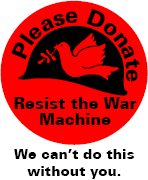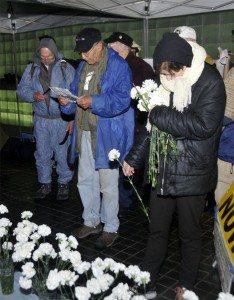By Ellen Davidson
Defendants took the stand July 10 at the third day of a trial of veterans and their allies arrested at New York City’s Vietnam Veterans Memorial Plaza last October. They are using the case to push back against what they see as increasing police and judicial encroachment on First Amendment rights to assembly and speech in public spaces.
The first day and a half of the trial featured contradictory testimony from police and park officials as to the actual boundaries of the New York City park that contains the memorial and its opening and closing times. At the end of the prosecution case, the defense moved for dismissal on the grounds that the government had not made a case for an overriding interest in keeping the park closed that would supersede citizens’ First Amendment rights and internationally protected rights to free speech.
 Defense attorney Jonathan Wallace of the National Lawyers Guild cited case law requiring that any restrictions on First Amendment rights must involve a “significant government interest” and be content neutral and narrowly tailored and that there must be “ample alternative” venues for the protected speech and assembly to take place. He said the only condition that was met in this instance was that the park ordinance was, on its face, content neutral.
Defense attorney Jonathan Wallace of the National Lawyers Guild cited case law requiring that any restrictions on First Amendment rights must involve a “significant government interest” and be content neutral and narrowly tailored and that there must be “ample alternative” venues for the protected speech and assembly to take place. He said the only condition that was met in this instance was that the park ordinance was, on its face, content neutral.
The judge denied the motion for dismissal, although he did dismiss charges against two of the fourteen defendants based on the failure of police witnesses to identify the arrestees, reducing the number of defendants to 12. Of the 25 originally arrested, 17 chose to go to trial rather than accepting a plea of Adjournment in Contemplation of Dismissal (essentially six months probation, after which the charges are removed from the record of no more arrests occur). On the first day of the trial, charges against the livestreamer were dismissed and two other defendants chose to take ACDs.
The first witness for the defense was the Tarak Kauff of Veterans For Peace, the principal organizer for the Oct. 7 action that led to the arrests. He laid out the reasons for the event, which featured a formal program of speakers, poets, and music for which a park permit and police sound permit had been obtained. It was after that portion of the evening, when veterans and their allies were reading the names of the dead from U.S. wars in Viet Nam, Afghanistan, and Iraq and placing flowers in vases, that the arrests were made for violating the park’s 10 pm closing time.
“First, we were there to mark 11 years of horrendous war in Afghanistan and we were calling for an end to that war,” said Kauff. “Two, we were calling for an end to all U.S. wars for empire, including Afghanistan and Iraq, and any other wars the U.S. might be involved in. Three, we were there to honor, remember, and lament the fallen and the wounded from Vietnam, Iraq, and Afghanistan, and we were there to read the names of those fallen. Fourth, and certainly not least important, based on previous experience, we realized that the only time that that 10 o’clock law was actually enforced was when people were gathering there to assemble, so we were there to affirm our right to assemble in a public space and speak the truth. And we feel that’s very important especially with all the wars that are going on. If we don’t have places to assemble and speak the truth, then we have nothing.”

VFP board member Tarak Kauff reads names of soldiers killed in Vietnam Oct. 7. To his left is Jay Wenk, ringing a gong as flowers are laid at the Vietnam Veterans Memorial. Minutes later, both had been arrested. Photo by ELLEN DAVIDSON
Prosecution witnesses repeatedly pointed out that organizers had made no attempt to get a permit to continue their event after 10 pm. Kauff explained that he had only requested permits for the period when a sound system was in use and that he did not feel a permit was required for First Amendment activities of assembly and speech in a public space. When asked whether he had permission to remain in the park after closing, Kauff said, “I did have explicit permission. I had permission from the Constitution of this country.”
Other defendants testified as to why they were present in the park that night. VFP member U.S. Marine Corps Major Ken Mayers explained that he was supporting VFP’s mission of abolishing war as an instrument of national policy: “I feel it is absolutely essential that we abolish war as an instrument of national policy if we are to survive as a species.” He also noted that “unless we exercise [oour right of assembly and free speech] it will atrophy and die.” He said he did not leave the park when ordered by police to do so “because I felt I had a constitutional right to be there I and I felt conscience-bound to exercise that constitutional right.”
“We had every right to gather and affirm our opposition to war,” said Ellen Barfield, a heavy equipment mechanic sergeant in the army from 1977 to 1981. It was “an intense and emotional evening,” she went on. She also described being arrested on the same plaza May 1, 2012, after a May Day march and a general assembly held by members of Occupy Wall Street at the memorial. Her testimony also contradicted the prosecution assertion that had the arrestees moved their commemoration a few feet away from the veterans memorial site to the adjacent open plaza, which is owned by the bordering office building at 55 Water Street, they would not have been in violation of the park’s closing time. Not only were the participants never given this option, she said (contrary to testimony by Captain Nicole Papamichaels of the First Precinct), she had been standing on the plaza portion when arrested on May 1 and charged with staying in the park after closing.
Granny Peace Brigade member Alice Sutter spoke of the significance of the Oct. 7 date for her. She felt a need to counteract the despair she felt because “we tried so hard to prevent” the invasion that began on that date. She described the “very moving testimony” of those involved personally in war, and talked about how as the names were read, she thought of each individual human being and how they must have had loved ones who still grieve their loss.
Bill Perry, a corporal in the army who participated in the Tet offensive during the Viet Nam War, described how he frequently visited the memorial after hours on other occasions, especially with other soldiers. He works with veterans who suffer from post-traumatic stress disorder and other wounds of war, and said that it was therapeutic for his clients to visit the memorial to begin their healing process. He said the veterans were there Oct. 7 “to commemorate the dead, honor the dead, and enlighten each other about ways to tone down our headlong rush to create more dead.”
The defense case is expected to last one more day, and then Judge Robert Mandelbaum will deliver a verdict. Some of the defendants have pledged that if convicted, they will refuse to do any community service or pay any fines, preferring to go to jail than acknowledge that they were guilty of any criminal activity. Supporters can attend the trial at 100 Centre Street, Room 535, from 9:30 am to 4:30 pm.
